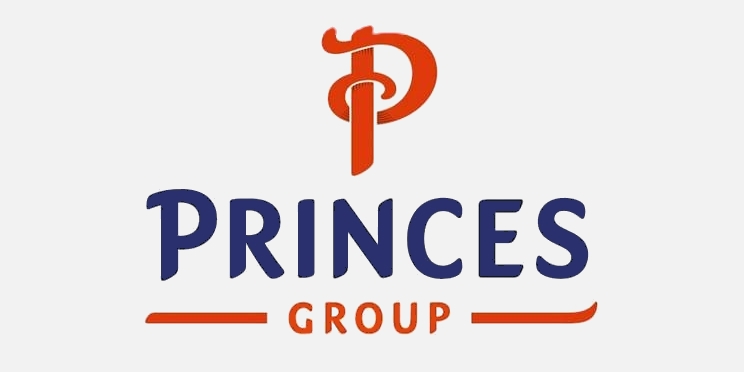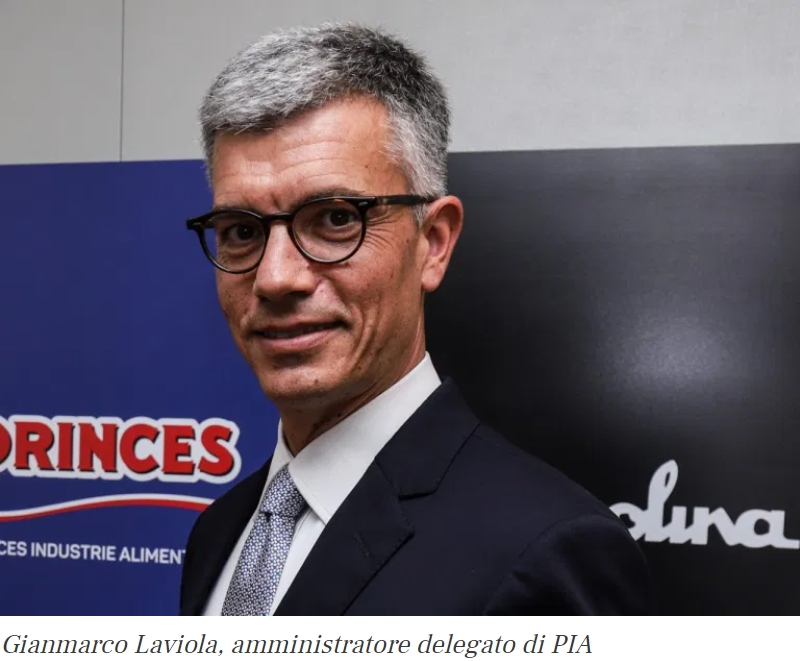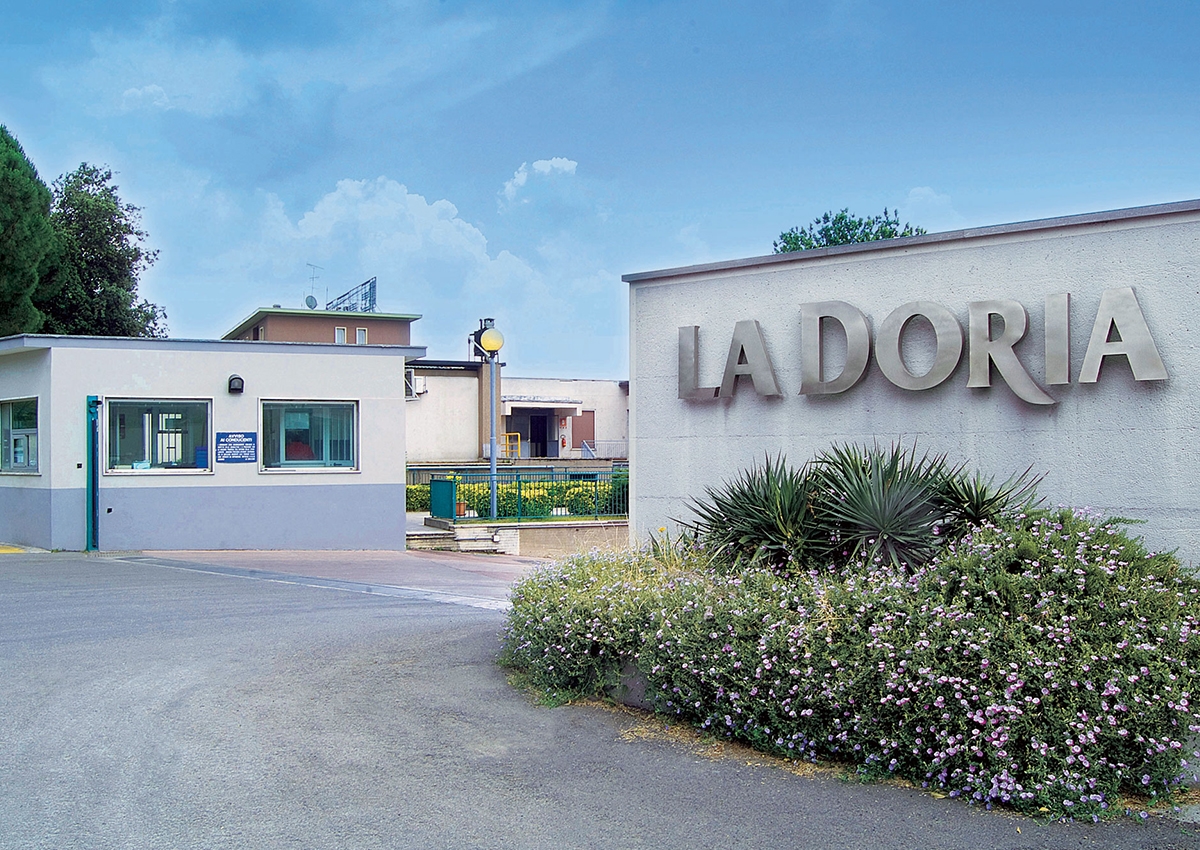PIA and La Doria focus on economic, environmental and ethical sustainability
The industry must consider 360° sustainability
 The Italian factory of Princes Industrie Alimentari (PIA), a 500,000 square meter facility in the Foggia region, has a production capacity of over 300,000 tonnes of fresh vegetables per year. This is the largest tomato processing site in Europe, a focal point for farmers from all over southern Italy, and its watchword is sustainability.
The Italian factory of Princes Industrie Alimentari (PIA), a 500,000 square meter facility in the Foggia region, has a production capacity of over 300,000 tonnes of fresh vegetables per year. This is the largest tomato processing site in Europe, a focal point for farmers from all over southern Italy, and its watchword is sustainability.
The Foggia factory also serves as the Italian headquarters of PIA, a leading tomato processing company founded in 2012, controlled by the Liverpool-based Mitsubishi Corporation. The plant produces tomato pastes, “polpa” (pulped or crushed peeled tomato flesh), canned cherry tomatoes, and whole or chopped peeled tomatoes, using fresh tomatoes harvested exclusively in the Apulia region. The plant employs 500 people throughout the year, but the workforce exceeds 1,600 at the height of the processing season.
On the site, thirty production lines supply a variety of products ranging from tomato products to legumes or dried pulses. To ensure greater production efficiency, the plant has been equipped with four production lines for canned goods and two labeling and packaging lines, allowing the immediate packaging of products in different formats, as well as packaging lines that are directly integrated into the production process, for the direct packaging of goods.
 To control the environmental impact, the company produces 500 g cans which, in addition to their excellent performance in terms of sales, comply with standards of sustainability by reducing the environmental impact. The company has also reduced its CO2 emissions generated by the road transport of fresh produce by more than 280 tonnes over the 2017-2018 period. This is done this by favoring crops grown close to the factory, thus improving the quality of tomatoes when they arrive at the plant.
To control the environmental impact, the company produces 500 g cans which, in addition to their excellent performance in terms of sales, comply with standards of sustainability by reducing the environmental impact. The company has also reduced its CO2 emissions generated by the road transport of fresh produce by more than 280 tonnes over the 2017-2018 period. This is done this by favoring crops grown close to the factory, thus improving the quality of tomatoes when they arrive at the plant.
The processing method aims to achieve the sustainable development targets of the United Nations: “The points on which the company is taking concrete actions,” stated Gianmarco Laviola, CEO of Princes Industrie Alimentari, “are water management, energy efficiency, recycling rejected fruit and packaging waste, using more sustainable packaging and reducing the distances of road-travel by offering alternative modes of transport and new storage solutions, in collaboration with logistics providers.”
In collaboration with the agronomic department of the University of Foggia, a scheme called the “EcofertTM Project” was developed and implemented by the company to reduce the consumption of irrigation water and nitrogen in the soil. “This technology,” explained Laviola, “places the growing region of the Capitanata in the foreground of worldwide production and also allows a considerable saving for the farms.”
In 2019, EcofertTM crops covered around 650 hectares of cultivation, reducing the quantities of water used by 1 million cubic meters and those of nitrogen by 6 tonnes, thus saving around EUR 1,100 to 1,400 per hectare. “The project,” underlined the PIA CEO, “will be extended to all partner growers during the next tomato season.”
 Digital traps are used in the fields as a means of pest control, allowing continuous monitoring and reducing the need for plant-health inputs. “Thanks to pheromones that attract pests, an automated system is able to map the specific species and determine the appropriate treatments and quantities required, with obvious positive results for the quality of our products. In fact, the vast majority of our products are already completely free of chemical residue.”
Digital traps are used in the fields as a means of pest control, allowing continuous monitoring and reducing the need for plant-health inputs. “Thanks to pheromones that attract pests, an automated system is able to map the specific species and determine the appropriate treatments and quantities required, with obvious positive results for the quality of our products. In fact, the vast majority of our products are already completely free of chemical residue.”
“We recently changed the packaging of our products to adopt a nestable carton system that does not require the use of plastic, glue or any other adhesive chemical material. The cardboard is made from an optimized blend of unbleached and recycled virgin fibers, and is recyclable and naturally biodegradable. Our supplier is certified and complies with the requirements of the most important international organizations for the protection of forests such as the Forest Stewardship Council (FSC), the Sustainable Forestry Initiative (SFI), the Program for the Endorsement of Forest Certification (PEFC), and the certification standards of Chain of Custody Forest. It is also compliant with the SFI Certified Sourcing standard.”
For the start of the next season, the Foggia plant is preparing for an energy efficiency program, to be rolled out in several phases, the first of which will involve the installation of a cogeneration system to provide the electricity necessary for processing the tomatoes. The system helps reduce energy requirements and CO2 emissions by eliminating the energy-loss typical of a wide area grid.
“In addition, investments have been made in the context of circular economy practices that we are developing with the University of Foggia. These are projects that focus on the recovery, recycling, and reuse of processing by-products – materials that are naturally rich in valuable organic substances that can be reused instead of being disposed of.”
For Laviola, it is now crucial to promote a production process that must consider 360° sustainability, capable of embracing the economic, environmental and ethical aspects of the entire processing tomato sector, allowing companies to give back to the territory and to the community what they have “received” in terms of natural and personal resources.
“This practically 'holistic' approach to sustainability is essential to build a long-term future for all players of the tomato industry and the agri-food sector in general, but also to respond to the increasing attention paid by consumers to products that are ever more sustainable, traceable and 100% Made In Italy.”
According to the CEO of PIA, it is through the promotion and certification of true “Made in Italy” products that it becomes possible to protect and support companies that commit to and invest in care for the environment. “In this context," concludes Laviola, "I think that improving the traceability of products thanks to a blockchain system – which makes the Italian origin of products transparent and certain – is a fundamental asset for the sustainability of the industry.”
Intesa Sanpaolo issues loan to La Doria for sustainable development
"This agreement confirms La Doria's long-standing focus on sustainable development"
 On April 9, Italian press revealed that Intesa Sanpaolo and La Doria, one of the largest Italian producer of tomato products, ready-made sauces, fruit drinks and preserved legumes, and present in the most important supermarket and discount chains both in Italy and abroad, have signed a 10-million-euro loan agreement aimed at achieving specific sustainability targets.
The transaction consists of a 7-year credit facility with an Euribor-indexed interest rate, and features a pricing mechanism tied to the achievement of specific ESG (Environmental, Social, Governance) targets. The loan provides La Doria with liquidity to support its Investment Plan and confirms the company's firm commitment to introducing a model focused on further establishing sustainability as a strategic driver for creating value for all its stakeholders.
"Our commitment to sustainability has always been a guiding principle behind everything we do", says Antonio Ferraioli, Chairman of La Doria, "and the loan agreement with Intesa Sanpaolo's IMI Corporate & Investment Banking Division is completely in line with the company's identifying values and policies, which are increasingly focused on investing in sustainable development projects. The funds will finance improvement objectives related to the environment, the supply chain and the working conditions of our employees, all of which are areas in which our efforts are focused in order to increase the sustainability of our Company from an environmental, social and governance perspective".
On April 9, Italian press revealed that Intesa Sanpaolo and La Doria, one of the largest Italian producer of tomato products, ready-made sauces, fruit drinks and preserved legumes, and present in the most important supermarket and discount chains both in Italy and abroad, have signed a 10-million-euro loan agreement aimed at achieving specific sustainability targets.
The transaction consists of a 7-year credit facility with an Euribor-indexed interest rate, and features a pricing mechanism tied to the achievement of specific ESG (Environmental, Social, Governance) targets. The loan provides La Doria with liquidity to support its Investment Plan and confirms the company's firm commitment to introducing a model focused on further establishing sustainability as a strategic driver for creating value for all its stakeholders.
"Our commitment to sustainability has always been a guiding principle behind everything we do", says Antonio Ferraioli, Chairman of La Doria, "and the loan agreement with Intesa Sanpaolo's IMI Corporate & Investment Banking Division is completely in line with the company's identifying values and policies, which are increasingly focused on investing in sustainable development projects. The funds will finance improvement objectives related to the environment, the supply chain and the working conditions of our employees, all of which are areas in which our efforts are focused in order to increase the sustainability of our Company from an environmental, social and governance perspective".
 La Doria is listed on the Star segment of the Italian Stock Exchange, and is Europe's leading producer of preserved legumes, peeled and chopped tomatoes in the retail channel, and one of Italy's leading producers of fruit juices and drinks. The Company is also Europe's leading producer of private label ready-made sauces. In 2020, the Company reported revenues of 848 million euro, 97% of which was generated through the private label segment with leading national and international retailers.
Source: linkiesta.it, group.intesasanpaolo.com, efanews.com
La Doria is listed on the Star segment of the Italian Stock Exchange, and is Europe's leading producer of preserved legumes, peeled and chopped tomatoes in the retail channel, and one of Italy's leading producers of fruit juices and drinks. The Company is also Europe's leading producer of private label ready-made sauces. In 2020, the Company reported revenues of 848 million euro, 97% of which was generated through the private label segment with leading national and international retailers.
Source: linkiesta.it, group.intesasanpaolo.com, efanews.com


 The Italian factory of Princes Industrie Alimentari (PIA), a 500,000 square meter facility in the Foggia region, has a production capacity of over 300,000 tonnes of fresh vegetables per year. This is the largest tomato processing site in Europe, a focal point for farmers from all over southern Italy, and its watchword is sustainability.
The Italian factory of Princes Industrie Alimentari (PIA), a 500,000 square meter facility in the Foggia region, has a production capacity of over 300,000 tonnes of fresh vegetables per year. This is the largest tomato processing site in Europe, a focal point for farmers from all over southern Italy, and its watchword is sustainability. To control the environmental impact, the company produces 500 g cans which, in addition to their excellent performance in terms of sales, comply with standards of sustainability by reducing the environmental impact. The company has also reduced its CO2 emissions generated by the road transport of fresh produce by more than 280 tonnes over the 2017-2018 period. This is done this by favoring crops grown close to the factory, thus improving the quality of tomatoes when they arrive at the plant.
To control the environmental impact, the company produces 500 g cans which, in addition to their excellent performance in terms of sales, comply with standards of sustainability by reducing the environmental impact. The company has also reduced its CO2 emissions generated by the road transport of fresh produce by more than 280 tonnes over the 2017-2018 period. This is done this by favoring crops grown close to the factory, thus improving the quality of tomatoes when they arrive at the plant. Digital traps are used in the fields as a means of pest control, allowing continuous monitoring and reducing the need for plant-health inputs. “Thanks to pheromones that attract pests, an automated system is able to map the specific species and determine the appropriate treatments and quantities required, with obvious positive results for the quality of our products. In fact, the vast majority of our products are already completely free of chemical residue.”
Digital traps are used in the fields as a means of pest control, allowing continuous monitoring and reducing the need for plant-health inputs. “Thanks to pheromones that attract pests, an automated system is able to map the specific species and determine the appropriate treatments and quantities required, with obvious positive results for the quality of our products. In fact, the vast majority of our products are already completely free of chemical residue.” On April 9, Italian press revealed that Intesa Sanpaolo and La Doria, one of the largest Italian producer of tomato products, ready-made sauces, fruit drinks and preserved legumes, and present in the most important supermarket and discount chains both in Italy and abroad, have signed a 10-million-euro loan agreement aimed at achieving specific sustainability targets.
On April 9, Italian press revealed that Intesa Sanpaolo and La Doria, one of the largest Italian producer of tomato products, ready-made sauces, fruit drinks and preserved legumes, and present in the most important supermarket and discount chains both in Italy and abroad, have signed a 10-million-euro loan agreement aimed at achieving specific sustainability targets. La Doria is listed on the Star segment of the Italian Stock Exchange, and is Europe's leading producer of preserved legumes, peeled and chopped tomatoes in the retail channel, and one of Italy's leading producers of fruit juices and drinks. The Company is also Europe's leading producer of private label ready-made sauces. In 2020, the Company reported revenues of 848 million euro, 97% of which was generated through the private label segment with leading national and international retailers.
La Doria is listed on the Star segment of the Italian Stock Exchange, and is Europe's leading producer of preserved legumes, peeled and chopped tomatoes in the retail channel, and one of Italy's leading producers of fruit juices and drinks. The Company is also Europe's leading producer of private label ready-made sauces. In 2020, the Company reported revenues of 848 million euro, 97% of which was generated through the private label segment with leading national and international retailers.



























